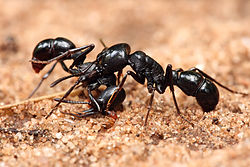formica
English
[edit]Etymology
[edit]A genericization of the trademark Formica, which see.
Noun
[edit]formica (countable and uncountable, plural formicas)
- A heat-resistant laminate material used to veneer countertops.
Synonyms
[edit]Hyponyms
[edit]Anagrams
[edit]French
[edit]Pronunciation
[edit]Audio: (file) Audio (Switzerland): (file)
Noun
[edit]formica m (plural formicas)
Italian
[edit]
Etymology 1
[edit]From Latin formīca, ultimately from Proto-Indo-European *morwi. Cognates include Ancient Greek μύρμηξ (múrmēx).
Alternative forms
[edit]Pronunciation
[edit]Noun
[edit]formica f (plural formiche)
Derived terms
[edit]Related terms
[edit]Etymology 2
[edit]Borrowed from English Formica.
Pronunciation
[edit]Noun
[edit]formica f (plural formiche)
- Formica (a plastic laminated material)
Etymology 3
[edit]See the etymology of the corresponding lemma form.
Pronunciation
[edit]Adjective
[edit]formica
Further reading
[edit]- formica in Collins Italian-English Dictionary
- formica in Luciano Canepari, Dizionario di Pronuncia Italiana (DiPI)
- formica in garzantilinguistica.it – Garzanti Linguistica, De Agostini Scuola Spa
- formica in Dizionario Italiano Olivetti, Olivetti Media Communication
- formica in sapere.it – De Agostini Editore
- formica in Treccani.it – Vocabolario Treccani on line, Istituto dell'Enciclopedia Italiana
Anagrams
[edit]Latin
[edit]Alternative forms
[edit]- furmīca (late, proscribed)
Etymology
[edit]From Proto-Italic *mormīkā, from Proto-Indo-European *morwi (a term with many deviating forms, probably taboo distortions, in various Indo-European languages). The irregular change of m- to f- can be explained by dissimilation of m- -m- to f- -m-.[1] Cognate with Sanskrit वम्र (vamra), Ancient Greek μύρμηξ (múrmēx), Old Church Slavonic мравии (mravii), Polish mrówka, Old Irish moirb, Welsh myrion, Old Norse maurr, English mire, Albanian morr.
Pronunciation
[edit]- (Classical Latin) IPA(key): /forˈmiː.ka/, [fɔrˈmiːkä]
- (modern Italianate Ecclesiastical) IPA(key): /forˈmi.ka/, [forˈmiːkä]
Noun
[edit]formīca f (genitive formīcae); first declension
Declension
[edit]First-declension noun.
| Case | Singular | Plural |
|---|---|---|
| Nominative | formīca | formīcae |
| Genitive | formīcae | formīcārum |
| Dative | formīcae | formīcīs |
| Accusative | formīcam | formīcās |
| Ablative | formīcā | formīcīs |
| Vocative | formīca | formīcae |
Derived terms
[edit]Descendants
[edit]- Balkan Romance:
- Dalmatian:
- Istriot:
- Italo-Romance:
- North-Italian:
- Gallo-Romance:
- Occitano-Romance:
- Ibero-Romance:
- Sardinian:
- formiga (Limba Sarda Comuna)
- Borrowings:
References
[edit]- “formica”, in Charlton T. Lewis and Charles Short (1879) A Latin Dictionary, Oxford: Clarendon Press
- “formica”, in Charlton T. Lewis (1891) An Elementary Latin Dictionary, New York: Harper & Brothers
- formica in Charles du Fresne du Cange’s Glossarium Mediæ et Infimæ Latinitatis (augmented edition with additions by D. P. Carpenterius, Adelungius and others, edited by Léopold Favre, 1883–1887)
- formica in Gaffiot, Félix (1934) Dictionnaire illustré latin-français, Hachette.
- ^ De Vaan, Michiel (2008) Etymological Dictionary of Latin and the other Italic Languages (Leiden Indo-European Etymological Dictionary Series; 7), Leiden, Boston: Brill, →ISBN, page 234
- English lemmas
- English nouns
- English uncountable nouns
- English countable nouns
- French terms with audio links
- French lemmas
- French nouns
- French countable nouns
- French masculine nouns
- Italian terms inherited from Latin
- Italian terms derived from Latin
- Italian terms derived from Proto-Indo-European
- Italian 3-syllable words
- Italian terms with IPA pronunciation
- Rhymes:Italian/ika
- Rhymes:Italian/ika/3 syllables
- Italian lemmas
- Italian nouns
- Italian countable nouns
- Italian feminine nouns
- Italian terms borrowed from English
- Italian terms derived from English
- Rhymes:Italian/ɔrmika
- Rhymes:Italian/ɔrmika/3 syllables
- Italian non-lemma forms
- Italian adjective forms
- it:Ants
- it:Insects
- Latin terms inherited from Proto-Italic
- Latin terms derived from Proto-Italic
- Latin terms derived from Proto-Indo-European
- Latin 3-syllable words
- Latin terms with IPA pronunciation
- Latin lemmas
- Latin nouns
- Latin first declension nouns
- Latin feminine nouns in the first declension
- Latin feminine nouns
- Latin terms with quotations
- la:Insects
- la:Ants
